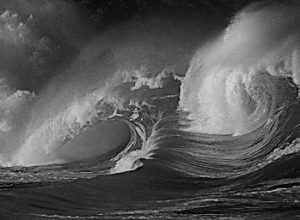
The answer to the question: who threw Jonah into the sea is simple. Jonah 1:15 says, “So they [the sailors] picked up Jonah, threw him into the sea, . . .”
However, upon closer reading of the text, someone else threw Jonah into the sea. To see this, we need to review the story.
In chapter one of the book of Jonah, Jonah is absolutely set on running from God (1:3). He despises God’s call to preach to the pagan Ninevites. He opts for his own plans. Of course, as God’s child, God will not simply let Jonah go head-long into self-destruction. So, God “hurls” a great storm upon the sea in pursuit of Jonah (1:4). It is only after Jonah tries to sleep away his miseries (1:5), and after the storm waxes worse and worse (1:11, 13), that Jonah realizes: God is after him (1:12)! Jonah, thus, concludes that either everyone on board ship will die, or he will die. Jonah chooses the latter (1:12). As good pagans, the sailors don’t want to kill Jonah, so they row harder to return to dry land (1:13). Unfortunately for them, God frustrates their plans, and eventually gets what he wants. The sailors have no choice but to “hurl” Jonah overboard (1:15).
In this riveting story from the life a Jonah, we learn an important and comforting theological truth. The theological truth we learn comes in answer to the question: who threw Jonah into the sea? The answer is the sailors threw Jonah into the sea, and God threw Jonah into the sea. Clearly, the sailors are the ones that threw Jonah into the sea (1:15). But Jonah also rightly recognizes that it was God who “cast me into the deep” (2:3).
The theological language we use is God’s sovereignty of secondary causes. God causes all things; he is sovereign over every detail. We say God is the first cause of everything in the universe. Yet, God uses means to accomplish his plans and purposes. Therefore, God stands behind everything as a first cause, but uses secondary causes—the sailors—to accomplish his will. As our brothers beautifully put it so long ago in the London Baptist Confession of 1689, the theological truth is that
All things come to pass unchangeably and certainly in relation to the foreknowledge and decree of God, who is the first cause. Thus, nothing happens to anyone by chance or outside of God’s providence. Yet by the same providence God arranges all things to occur according to the nature of second causes, either necessarily, freely, or in response to other causes.
When we look at Jonah’s life (or any of our lives), believe that God causes all things. But also believe that all the means or “secondary causes” (i.e., circumstances) are used by God to accomplish his will to glorify himself upon the earth and in our lives.
Pastor Dan